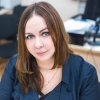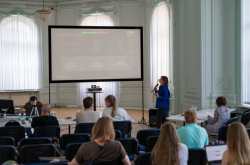Last year, a number of universities – including ITMO – received the right to award academic degrees and form their own thesis boards. This was a long-awaited change. What opportunities does it offer to universities and scientific organizations?
Maria Skvortsova: First of all, this new system will make it easier for us to become a part of the international scientific community and will increase the prestige of Russian education. This is conducive to building partnerships with our colleagues abroad with whom we have joint educational programs. I should note that other countries already award degrees within the university, and it’s often difficult to explain the intricacies of our system to our colleagues from abroad. This is why the creation of an accessible, logical system in our country is a major step forward that would let us assess candidates in cooperation with international partners and award two degrees simultaneously.
Secondly, all this opens up new opportunities for a significant increase in the quality of research expertise. To ensure this quality, we must involve a wider pool of both Russian and international experts when evaluating our research. In today’s world, it is absolutely necessary to encourage international expertise; the university itself, in its endeavor to globalize its activities, feels this need more and more.

Finally, it would let us try out and adapt the best practices used to carry out and evaluate PhD students’ research and combine them with our own experience.
The new system not only grants rights, but also expands the universities’ responsibilities. One of them is the higher quality of thesis defense. What are some of the measures that will make this happen?
Stanislav Reznikov: Today’s science is becoming increasingly more interdisciplinary; for instance, IT is becoming a big part of medicine, chemistry, biology. There are countless examples. Giving a number of leading universities the right to award degrees independently and form thesis boards is what will help expand and diversify their expert community, increasing the quality of each and any thesis evaluation. This new system helps us to form and maintain our expert community more dynamically, to react quickly to the changing scientific trends, which will ensure a well-rounded assessment of each paper and its research data.
And so there is no doubt that our task is to ensure a quality selection of experts and pick those specialists whose work, field and skill level are the most fitting for those researchers who defend their theses at our university.

Maria Skvortsova: Another task we have is to create an open, transparent system for awarding degrees, as well as to develop straightforward criteria by which we will pick the fields in which the university will award its degree, the experts to serve on the boards and the procedures by which they will operate. Right now we’re developing the procedure of preliminary thesis evaluation.
There are still a number of risks. For one, it is not yet clear who will consider appeals made in regards to defenses. How do you plan to solve these issues?
Maria Skvortsova: Since we’re the ones who make the final decision on whether or not to award a degree, there remains the question who will deal with any complaints, appeals, etc. As of now, the Higher Attestation Committee is looking into these matters, but in the process of transitioning to a new system, the university will have to think about forming an expert community. It would involve representatives of major universities and would serve a supervisory role, assessing the decisions made by individual universities and thesis boards.
Two leading universities – the Moscow State University and St. Petersburg State University – have been operating in this new manner since 2016. How representative is their experience?

These two universities both had their own approach. SPSU chose to form dynamic thesis boards, i.e. boards that are tailored for each research submitted for defense. At MSU, boards are formed and remain for a longer amount of time. We, however, plan to introduce our own flexible system that will draw from both of these universities’ experiences while adopting international practices. As of now, we are working with MSU to learn more about how they work.
How will the right to award degrees be exercised at ITMO University?
Maria Skvortsova: We plan to implement a system in which a thesis board has a core – a permanent expert group including a chairman, two deputies and a secretary, who will be joined by experts whose knowledge is relevant to the thesis at hand.
As we’ve already said, one of the key tasks right now is to outline and formalize strict and straightforward criteria for the list of scientific majors for which ITMO will award its degrees. Some of these criteria are, for example, sufficient scientific and talent potential; the amount of research done in this area at the university; publications, etc. This is the first task we’re going to tackle. Secondly, of course, we will define the criteria used to pick experts for the thesis boards.

After this, we will ramp up our international activity in this area and start attracting experts from abroad. Lastly, we will begin forming the community of outside specialists who will help us ensure transparency, openness and a high quality of evaluation. Our goal is to make the assessments well-rounded and as objective as possible.
What is being done at ITMO University right now to implement this new system: what has already been done and what will happen in the near future?
Maria Skvortsova: We first discussed this initiative in late 2017, and the general concept was presented on December 26 at the Academic Council’s final session of the year. We plan to make several visits to universities that have already implemented or are working on the same system. We’ve already planned out a trip to Moscow State University, for instance; MSU is our biggest source of experience in this regard. We are examining our colleagues’ experience and forming our own concept; we utilize the best practices, but, of course, we will try to take into account the tasks and challenges faced by ITMO University specifically.
We’ve also looked at some of the international practices. For example, we’ve already visited some of our partner universities, like the University of Lille, University of Le Mans and Aalto University; we attended thesis defenses and studied the methods they developed over the years.
We also looked into and summarized the experiences of scientists who work at ITMO University and have previously participated in thesis defenses abroad, have a PhD and are professors of international universities. There are quite a few such specialists here, so we were able to hear a variety of opinions.

For example, last year several of our students received diplomas from top international universities through double-degree programs at our partner universities: these are Alexey Slobozhanyuk (The Australian National University), Sergey Kosulnikov (Aalto University), Vanik Shahnazaryan (University of Iceland), Sergei Vlasov, Sergei Lyashko (University of Le Mans), and others.
This helped us define the key goals of our future work and understand how to combine internationally successful practices with the Russian system. We’ve already begun drafting the regulatory framework and developing the various criteria.
When do you expect to fully introduce this initiative?
All these new features that we’ve talked about will be put into practice starting on September 1, 2018, the first one being the opening of the university’s own thesis boards.





